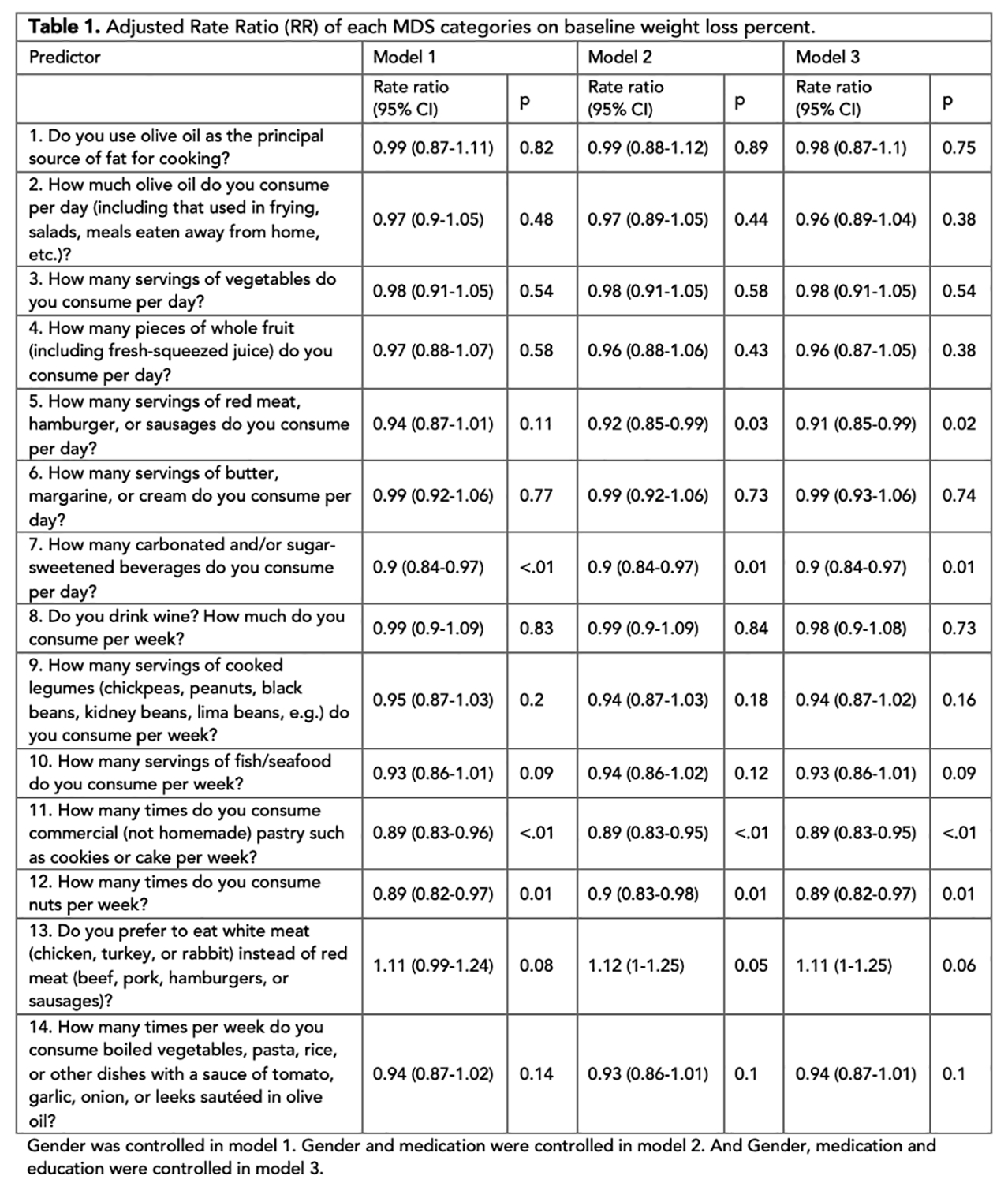Final ID: MP04
Association of Mediterranean Diet Score Components with Weight Loss: Findings from the MAINTAIN PRIME Study
Abstract Body: Introduction. Caloric intake and diet quality are important for weight management. This study leverages data from the MAINTAIN PRIME weight maintenance trial, which recruited participants with recent, intentional weight loss ≥ 5%. We analyzed the association between diet quality and percentage weight loss at study enrollment.
Methods. We assessed diet quality with the Mediterranean Diet Score (MDS), a validated 14-item survey, and examined individual components, each with 2 or 3 categorical levels. The association between percentage weight loss and MDS components was analyzed using gamma regression with log link across three models: Model 1 controlled for gender, Model 2 for gender and weight loss medication use, and Model 3 for gender, medication use, and education. Rate ratios (RR) and 95% confidence intervals (CI) were calculated for each MDS component.
Results. Baseline weight and Mediterranean Diet Score (MDS) data were collected from 262 participants. Adjusted RR values for each component of the MDS are found in Table 1. Key findings include: Commercial pastries (cookies, cakes, etc.) The RR of 0.89 across all models (p <0.01), suggests a clear association between consuming more commercial pastries and less weight loss. Those who consume more are likely to experience about 11% less weight loss compared to those who consume less or none. Carbonated or sugar-sweetened beverages (CSSB): The RR of 0.90 across all three models (p ≤ 0.01) suggests that individuals who consume more CSSB experience 10% less weight loss compared to those who consume fewer or no CSSB. Nuts: The RR of 0.89–0.90 across all models (p = 0.01) indicates that a higher intake of nuts per week is associated with less weight loss. Red meat: Across the models, a higher red meat consumption was associated with less weight loss. While the association is not statistically significant in Model 1 (p = 0.11), it becomes significant in Model 2 (p = 0.03) and Model 3 (p = 0.02). Therefore, adjusting for additional variables strengthens the observed association. In Model 3, the RR of 0.91 indicates 9% less weight loss compared to those with lower or no red meat intake.
Conclusions. A higher consumption of commercial pastries, carbonated or sugar-sweetened beverages, nuts, and red meat was negatively associated with less weight loss, highlighting their potential role in hindering weight loss efforts. Our findings highlight the importance of diet quality management.
Methods. We assessed diet quality with the Mediterranean Diet Score (MDS), a validated 14-item survey, and examined individual components, each with 2 or 3 categorical levels. The association between percentage weight loss and MDS components was analyzed using gamma regression with log link across three models: Model 1 controlled for gender, Model 2 for gender and weight loss medication use, and Model 3 for gender, medication use, and education. Rate ratios (RR) and 95% confidence intervals (CI) were calculated for each MDS component.
Results. Baseline weight and Mediterranean Diet Score (MDS) data were collected from 262 participants. Adjusted RR values for each component of the MDS are found in Table 1. Key findings include: Commercial pastries (cookies, cakes, etc.) The RR of 0.89 across all models (p <0.01), suggests a clear association between consuming more commercial pastries and less weight loss. Those who consume more are likely to experience about 11% less weight loss compared to those who consume less or none. Carbonated or sugar-sweetened beverages (CSSB): The RR of 0.90 across all three models (p ≤ 0.01) suggests that individuals who consume more CSSB experience 10% less weight loss compared to those who consume fewer or no CSSB. Nuts: The RR of 0.89–0.90 across all models (p = 0.01) indicates that a higher intake of nuts per week is associated with less weight loss. Red meat: Across the models, a higher red meat consumption was associated with less weight loss. While the association is not statistically significant in Model 1 (p = 0.11), it becomes significant in Model 2 (p = 0.03) and Model 3 (p = 0.02). Therefore, adjusting for additional variables strengthens the observed association. In Model 3, the RR of 0.91 indicates 9% less weight loss compared to those with lower or no red meat intake.
Conclusions. A higher consumption of commercial pastries, carbonated or sugar-sweetened beverages, nuts, and red meat was negatively associated with less weight loss, highlighting their potential role in hindering weight loss efforts. Our findings highlight the importance of diet quality management.
More abstracts on this topic:
A Culturally Tailored mHealth Lifestyle Intervention Improves Diet and Physical Activity Self-Regulation Among African Americans
Lalika Mathias, Jenkins Sarah, Hayes Sharonne, Jones Clarence, Burke Lora, Cooper Lisa, Patten Christi, Brewer Laprincess
Assessment of Dietary Recall Plausibility Using an Updated Formula that Considers Energy Intake Measured by Doubly-Labeled WaterSantos Baez Leinys, Ravelli Michele N., Diaz-rizzolo Diana A., Popp Collin, Cheng Bin, Gallagher Dympna, Schoeller Dale, Laferrere Blandine

